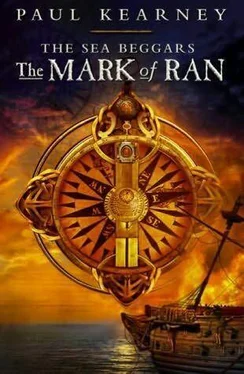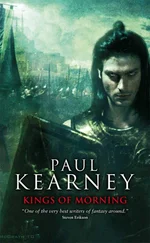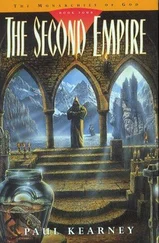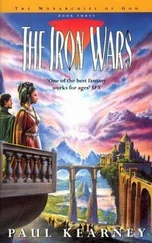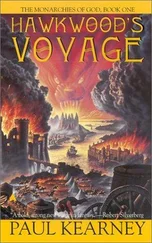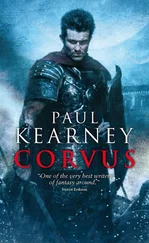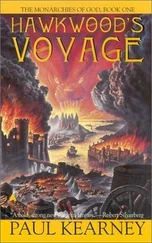Paul Kearney - The Mark of Ran
Здесь есть возможность читать онлайн «Paul Kearney - The Mark of Ran» весь текст электронной книги совершенно бесплатно (целиком полную версию без сокращений). В некоторых случаях можно слушать аудио, скачать через торрент в формате fb2 и присутствует краткое содержание. Жанр: Фэнтези, на английском языке. Описание произведения, (предисловие) а так же отзывы посетителей доступны на портале библиотеки ЛибКат.
- Название:The Mark of Ran
- Автор:
- Жанр:
- Год:неизвестен
- ISBN:нет данных
- Рейтинг книги:3 / 5. Голосов: 1
-
Избранное:Добавить в избранное
- Отзывы:
-
Ваша оценка:
- 60
- 1
- 2
- 3
- 4
- 5
The Mark of Ran: краткое содержание, описание и аннотация
Предлагаем к чтению аннотацию, описание, краткое содержание или предисловие (зависит от того, что написал сам автор книги «The Mark of Ran»). Если вы не нашли необходимую информацию о книге — напишите в комментариях, мы постараемся отыскать её.
The Mark of Ran — читать онлайн бесплатно полную книгу (весь текст) целиком
Ниже представлен текст книги, разбитый по страницам. Система сохранения места последней прочитанной страницы, позволяет с удобством читать онлайн бесплатно книгу «The Mark of Ran», без необходимости каждый раз заново искать на чём Вы остановились. Поставьте закладку, и сможете в любой момент перейти на страницу, на которой закончили чтение.
Интервал:
Закладка:
Nineteen
THE HIDDEN CITY
The highlands of GANESH were good to them. Untouched, unpopulated, they fairly teemed with game, animals so unafraid it seemed almost a shame to kill them. With the master’s unwieldy pistol Rol wounded two plump young bucks badly enough for Gallico to be able to run them down and break their necks. These were gralloched and skinned, and their livers eaten warm and raw by the famished castaways as the halftroll jointed the remainder. Then the trio lay and slept the night through with their feet turned to the warmth of a high bonfire, too exhausted to care who might mark the man-made blaze in the darkness of that vast wilderness. The nights were not so cold here as on the Flats, but still chilly enough to warrant the gathering of grass and heather for bedding and the sheer luxury of a good wood fire to keep the frost from their bodies. They were high up, and when dawn came they could look out on a great panoramic view of the Inner Reach, as grand as kings.
“I see ships,” Creed said, looking into the bright fire of the eastern dawn.
“Where away?” Rol asked.
“East-southeast. Three-no, four, ship-rigged and in convoy.”
“Men-of-war,” Gallico said somberly. “Probably part of the flotilla that pursued the Adder. The Bionari are taking an almighty interest in this coast all of a sudden. I wonder if it’s anything to do with their civil war.”
“This city of yours had best be well hid,” Rol told him.
They walked northward along the coast for thirteen days and in all that time they saw no further sign of man or his works. On their right the Inner Reach swept white-tipped to the horizon and on their left the hills rolled in rumpled, rocky succession to the heights of the Myconians, draped with dark forests of pine and poplar, fragrant with wild thyme. Rol buried the master’s pistol, having run out of bullets for it, and Gallico fashioned a sling out of deerhide that knocked down rabbits and birds for their nightly meals. They raided birds’ nests, nibbled wild sorrel and bracken shoots, and drank from every stream they came across, finally satiating their inordinate thirst. Their wounds healed and the constant walking and short commons pared down the flesh of their bodies until they became tireless creatures of muscle-wrapped bone, at home in the high woods and mist-shrouded crags of this quiet world.
They came upon Ganesh Ka at evening, rounding the bluff of one outflung arm of the mountains that towered above the spear-straight poplars at its foot. There was a gap in this tall buttress of granite, as square and sheer as though cut with a knife, and once through it the land descended steeply to the sea over a mile below. The last sunlight was disappearing behind the Myconians, and below them, purple and blue with evening shadow, was the perfect circle of a deep bay surrounded on all sides by honey-pale cliffs about which thousands of seabirds circled and wailed. Its only outlet to the open sea was a narrow gap in the circle to the east, scarcely half a cable wide.
But on the landward side the cliffs were less steep, and seemed to have been broken off short. They had been hewn back and shaped in a way that made it hard to guess whether their fashioning was the work of man or a freak of nature. Tunnels or caves riddled them at sea level, but there were no signs of life in those black-shadowed holes.
Slender blade-shaped towers of darker rock were perched on the crest of the cliffs like stone-sculpted poplars, at once part of and distinct from the landscape about them. The tallest of these reared up twenty or thirty fathoms from base to sharp tip and they were built in orderless clusters that had nonetheless a pleasing kind of half-glimpsed symmetry about them. Looking closer, Rol saw that about the base of these towers was a talus of deeper shadow, coigns of light and dark-streets and roadways. If they had an overall pattern, then the knots and copses of trees that grew amongst them obscured it. Overall the place had an eerie, forbidding quality, like a monument erected to forgotten gods. Though there were no lights in the towers, no movement in the tree-clogged streets, Rol could smell woodsmoke, carried past them by the onshore breeze.
“Ganesh Ka,” Gallico said with satisfaction and a weary kind of relief.
“It looks deserted.” Rol frowned. If truth be told, it did not look like a city at all, more a geological formation, an immense abstraction thrown up on a whim by the Creator.
“Come full dark, you would see it come to life with lights, but only on the landward side. The cliffs are tunneled deep, and could house many thousands with ease. Most choose to live in the towers.”
“How many live here?” Creed asked. As he spoke, he saw the flicker of lamps being lit far up in the spines of the towers, tiny yellow gleams dwarfed by the massiveness of the stone. It was an unsettling sight, like seeing movement in the skin of a megalith. The windows must be so deep-set as to be almost invisible.
“Some thousands,” Gallico said. “It varies, depending on how many ships are at sea. The tunnels at the base of the cliffs lead to a vaulted underground harbor with wharves of solid stone. Fifty men-of-war could tie up there with ease. The whole city is built inside the circuit of a half-drowned crater, formed in some past catastrophe of the ancient world.”
The moon was rising, well on the way to becoming full. Out at sea a band of translucent pink cloud was smeared across the eastern skyline and the light was climbing red up the pinnacles of Ganesh Ka’s towers whilst below the sea grew dark with the onset of night. More lights were kindled in those tall spires of rock, and as the day dwindled the lights stood out alone in the gathering dark, a spangled tracery soaring up out of the sea.
“It’s beautiful,” Creed breathed. He looked like an exile within sight of home, his face transfigured. “I have dreamed of this day.” His voice choked and he bent his head. Gallico laid one great paw lightly upon his shoulder.
“The work of the Ancients, yet again,” Rol said, oblivious. “I am to wander from one Weren relic to another, it seems.” He turned to his companions, cold eyes unreachable. “Well, let us go down.”
There had been a wall once, more a demarcation than a defense, but this had crumbled and was now little more than a rockery for dense thickets of lavender and juniper and a few stunted olive trees. They clambered over it without difficulty and found themselves in the skeleton of a town. Roofless walls delineated narrow guttered streets. Doorways opening into nothingness, windows of blackness. Rol was at once reminded of the cavern below the foundations of Psellos’s Tower where his former life had come to ruin. The same perfect masonry, utterly devoid of any life or sign of use.
A dog barked somewhere and shattered the silence of the shadowed streets. Rol could smell rotting food, ordure, burning wood with the tang of resin in it. The trio tramped down the street like ghosts surrounded by a world they could not see, only hear and smell.
And halted as a band of shadows became solid before their eyes, materializing out of the side streets with no sound to mark their appearance except the click of metal and scuff of leather on stone.
“Who goes?”
Gallico grinned, his green eyes gleaming. “Who in merry hell do you think, Miriam?”
“A face like that could only have been made the once; God does not repeat His mistakes.” The speaker stepped forward. She was a tall, lean woman with a long face above which sprouted an untidy thatch of bright-colored hair. She smiled, revealing a wide gap between her front teeth. It gave her speech a lisping quality, though her voice was melodic as a harper’s. In her hands she held a long-barreled musket, a weapon Rol had seen only once or twice before in his voyaging. Her clothes were of worn buckskin, as were those of her companions. They all edged forward now behind her, and there was the gleam of more musket-barrels.
Читать дальшеИнтервал:
Закладка:
Похожие книги на «The Mark of Ran»
Представляем Вашему вниманию похожие книги на «The Mark of Ran» списком для выбора. Мы отобрали схожую по названию и смыслу литературу в надежде предоставить читателям больше вариантов отыскать новые, интересные, ещё непрочитанные произведения.
Обсуждение, отзывы о книге «The Mark of Ran» и просто собственные мнения читателей. Оставьте ваши комментарии, напишите, что Вы думаете о произведении, его смысле или главных героях. Укажите что конкретно понравилось, а что нет, и почему Вы так считаете.
